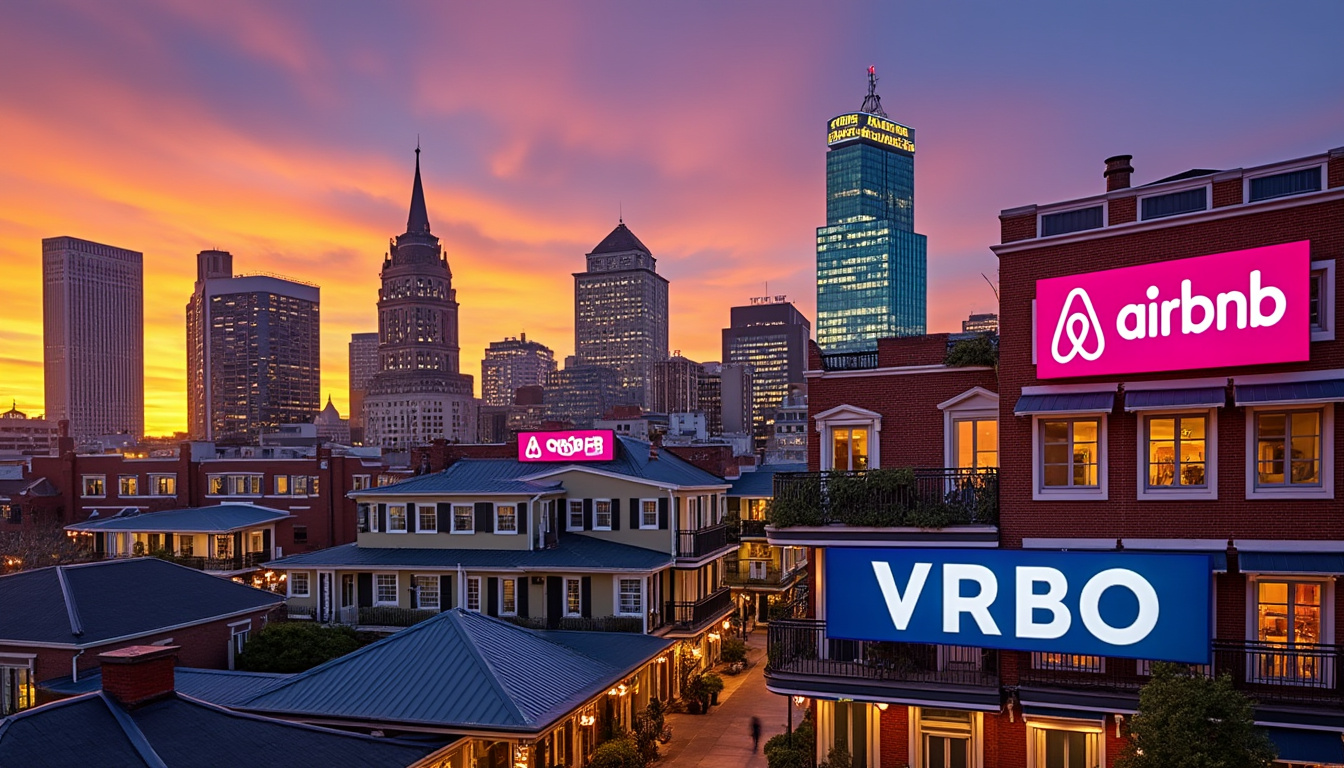The recent legal battle between the New Orleans City Council and Airbnb has unfolded dramatically, with significant implications for short-term rental regulations and the broader hospitality industry. On September 8, 2025, the U.S. District Court for the Eastern District of Louisiana, presided over by Judge Jay Zainey, dismissed nearly all of Airbnb’s claims against the City’s short-term rental laws. This ruling has been hailed as a pivotal victory for local governance, reaffirming the city’s ability to impose regulations designed to preserve housing affordability and protect neighborhood integrity. The court’s decision reflects a critical point in the ongoing struggle between traditional city ordinances and the disruptive nature of home sharing platforms.

Background of Short-Term Rental Regulations in New Orleans
New Orleans has faced a complex relationship with short-term rentals (STRs), particularly with the emergence of platforms like Airbnb. Historically, the city has grappled with balancing the interests of homeowners and local residents against the backdrop of a booming tourism economy. The initial regulations came into play with the City Ordinance established in 2016, which mandated permits for those looking to rent their properties on a short-term basis. However, these regulations have evolved as the city aims to combat challenges related to housing availability and neighborhood preservation.
The latest chapter in New Orleans’ regulatory history began with the 2023 laws aimed at stringent oversight of STRs. These laws require platforms such as Airbnb to verify that all listings are legally permitted before allowing bookings to take place. This is a significant step towards ensuring that homes are not used as unregulated vacation rentals, effectively removing potential abuses of zoning laws intended to protect residential areas.
Furthermore, the law mandates regular reporting from rental platforms, a move aimed at maintaining transparency about the number of allowed STRs in the city. The backdrop of increasing public sentiment against non-compliance from platforms concerning housing regulations has intensified the push for effective enforcement. With this historical context, the recent legal battle truly represents a crucial pivot point for New Orleans.
Key Aspects of the Court Ruling
In a deeply analyzed 51-page ruling, Judge Zainey addressed ten of the eleven claims made by Airbnb, bluntly stating that the city’s right to regulate commercial activities within residential neighborhoods is substantial. The ruling also emphasized that operating a STR is not a fundamental right protected by the Constitution. This aspect alone brought forth a key precedent within the legal landscape governing STRs, signaling that local governments possess the authority to safeguard their communities against disruptive practices.
Alongside this, the court recognized the city’s preparations for long-term rental opportunities amidst a regulatory landscape that restricts STR operations to ensure compliance. This ruling serves as an affirmation of the New Orleans City Council’s efforts to manage the surge of STRs more effectively, aligning public policies with the community’s needs.
It is also noteworthy that the only aspect of Airbnb’s claims that wasn’t dismissed dealt with privacy rights under the Fourth Amendment, reflecting concerns regarding the reporting requirements imposed on platforms. The decision underscored the necessity of having a neutral forum for contesting these obligations prior to enforcement, illustrating a measured balance between regulatory requirements and the rights of service providers.
Concerns and Implications for Homeowners
The legal decisions surrounding STR regulations not only impact platform providers like Airbnb but also have considerable ramifications for local homeowners and residents. Understanding these effects is crucial for stakeholders involved in property management and the hospitality industry. Many homeowners may be concerned about how these limitations affect their income potential from vacation rentals.
- Regulatory Compliance: Homeowners must navigate stringent regulations to avoid penalties.
- Market Dynamics: The viability of STR operations could significantly reduce due to comprehensive oversight.
- Community Sentiment: Stricter laws aim at restoring neighborhoods, which may lead to mixed feelings among residents.
In response to the ruling, Council President JP Morrell noted that the decision marked a significant affirmation of the local government’s regulatory authority, designed to address concerns about irresponsible home-sharing practices. Airbnb, for its part, expressed disappointment with the ruling, signaling intentions to appeal. This ongoing legal battle reflects broader tensions over the control and usage of residential properties in tourist-heavy cities across the United States.
Impact on the Hospitality Industry and Future Regulations
The ramifications of the ruling extend beyond the immediate legal concerns, presenting a broader impact on the hospitality industry as it navigates the evolving landscape of short-term rentals. As cities across the country grapple with the implementation of regulations similar to those in New Orleans, the results of this legal battle could set crucial precedents for the future.
In light of recent developments, vacation rental operators must reassess their strategies to remain compliant with local laws while maximizing profitability. The increasing shift toward stricter regulations indicates a growing trend where localities are seeking to regulate the hospitality market more strictly. This shift may also inspire legislative proposals in other urban environments battling similar housing crises.
The New Orleans City Council played a proactive role in drafting regulations that align with the city’s vision of maintaining affordable housing and vibrant neighborhoods. This adapted regulatory framework can serve as a model for other municipalities looking to establish their responses to the influx of STR platforms in their markets.
Strategies for Property Management and Hospitality Businesses
With the regulatory landscape shifting, property owners and managers in New Orleans—and beyond—need to implement strategies that align with local laws while ensuring their business remains viable. Below are some strategies that stakeholders can adopt:
- Stay Informed: Regularly review changes in local ordinances and legal precedents to ensure full compliance.
- Enhance Communication: Maintain open lines with local authorities to navigate changes collaboratively.
- Diversify Offerings: Consider diversifying rental options, including long-term rentals to mitigate risks.
As these adaptations evolve, successful hospitality businesses will need to balance compliance and operational flexibility while innovating their services to meet traveler needs. Operating within a regulated environment can also help local governments better address community concerns while providing clear avenues for legal recourse and regulatory integrity.

The Broader Context of Legal Battles Against STR Platforms
The legal confrontation between the New Orleans City Council and Airbnb is not an isolated incident. Cities across the United States are increasingly up against STR platform giants, striving to implement regulatory frameworks that benefit local communities. This trend mirrors a wider national discussion on housing availability, regulatory authority, and corporate responsibilities.
Case studies from cities such as San Francisco, New York, and Seattle reveal that battles over STR regulations are common, with various outcomes shaping the vacation rental landscape. As legislation on short-term rentals continues to evolve, local governments will need to find ways to manage their interests in housing availability and tourism while also respecting the operational realities of platforms like Airbnb.
Looking ahead, evolving case law will likely influence regulations at both the municipal and federal level, fostering discussions about taxation, compliance, and community rights. The outcomes of these legal disputes will not only impact individual municipalities but also resonate throughout the industry.
Potential Future Developments in STR Regulations
As the New Orleans legal battle illustrates, cities may foreseeably impose more comprehensive regulations. Possible developments could include:
- Increased Reporting Requirements: Expansion of data-sharing regulations for transparency in STR occupancy.
- Enhanced Fines: Implementation of more severe penalties for non-compliance with local laws.
- Fostered Negotiations: Opportunities for municipalities and STR platforms to develop cooperative frameworks.
Ultimately, as cities evolve in their regulatory approaches, they must remain adaptable and open to dialogue with stakeholders. Engaging with the broader community will ensure that regulations reflect the diverse needs and interests of residents, aligning with economic and social objectives of the community.
Conclusion of the Legal Battle: Implications for New Orleans and Beyond
The outcome of this legal confrontation will undoubtedly reverberate throughout New Orleans and potentially serve as a blueprint for municipalities grappling with the influence of STR platforms. As the New Orleans City Council continues to uphold the rights to regulate short-term rentals, homeowners, property managers, and hospitality businesses must navigate a transformed legal landscape.
Through continued diligence in monitoring regulations, adapting business practices, and maintaining clear communication with authorities, stakeholders can thrive within the new framework created by recent rulings. The need for responsible regulation aligns with broader societal goals of preserving local neighborhoods while accommodating tourism and the business of hospitality.
The evolving narrative surrounding STRs in New Orleans exemplifies the broader struggle taking place in cities across the country. It showcases the importance of balancing corporate interests with community needs as they navigate the path toward sustainable urban management. As this legal landscape shifts, communities must remain vigilant and proactive in shaping the future they envision.
